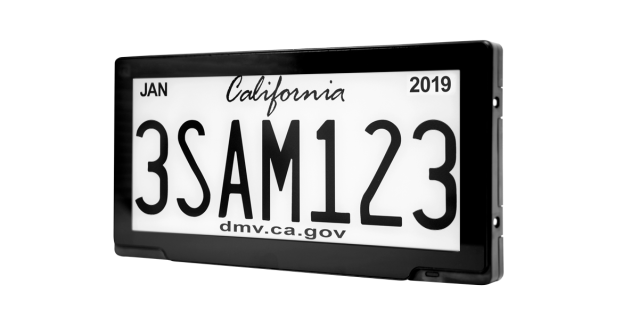Alex Roy’s father had a saying:
Anything is possible, but not everything is necessary.
Some would say you could apply this sentiment to the the Internet of Things (IoT). You could certainly apply it to the Rplate: “the world’s first digital license plate and cloud app store.”
Yes, now we can add license plates to the pile of “do we really need xyz IoT thing,” which already includes internet-enabled fridges, toasters, washing machines and coffee makers.
Roy, editor of a website called The Drive, points out that contrary to the manufacturer’s claim, the Rplate isn’t the first digital license plate.
But it is, in fact, the one that California is now piloting.
The IoT sitting inside your car’s license plate: what could possibly go wrong? But let’s start with this question: Why?
As the Sacramento Bee reports, California is the first state to adopt the digital plates. A pilot project was launched last week. Sacramento is also scheduled to start testing the plates on some of the cars in the city’s fleet.
The plates will enable those motorists who choose to buy them (the digital plates aren’t required, and they’re certainly not cheap; think in the ballpark of $699, plus installation fees, plus a monthly fee of about $7) to electronically register their vehicles. That means no more stickers that you have to slap onto your plates every year. If the Department of Motor Vehicles (DMV) decides to allow it, the plates will also be able to display personal messages that car owners can change at will.
Another advantage: according to the plate manufacturer, Reviver Auto, the plate can let police and the owner know exactly where a stolen car is – unless, that is, the thief takes off the plate. Then, at least you’ll know where the plate has been tossed.
But if the police can track your car when it’s been stolen, what’s stopping them from tracking you while you’re just normally driving around?
Beyond the risk of police surveillance, the plates could be as susceptible to hacking as other wireless and IoT technologies.
Everyday objects – things like kettles, TVs and baby monitors – are getting connected to the internet with elementary security flaws still in place.
There’s no suggestion that California police currently have plans to use the digital plates for surveillance or law enforcement. At least, not beyond what law enforcement already does with automated license plate readers. Beyond the Drug Enforcement Administration’s (DEA’s) license plate reader program, which tracks millions of Americans, Los Angeles had a novel idea for how to use the technology: back in 2015, the city proposed using the readers to figure out who owns cars that park or drive slowly through areas known for prostitution, after which “Dear John” letters would be sent, with the hope that they’d be intercepted by wives, mothers and girlfriends.
According to the Sacramento Bee, Sacramento’s innovation officer, Louis Stewart, said the city took shipment last week of 24 new Chevy Volts with Rplate devices that it got for free from Reviver. Stewart said that when a car is stopped, its license can display programmed public service messages, such as street closure notifications, an ad for a city service, an Amber or Silver Alert warning for missing or abducted children, or some other emergency alert.
First, though, the city has to talk with the labor union about refraining from using the plates to monitor city employees, he said.
Stewart says he sees the plates as a stepping stone, along with an upcoming Verizon 5G Wi-Fi network, for the city to position itself as a testing ground for autonomous or driverless vehicles. The Sacramento Bee quoted Stewart, who says that welcoming Rplates to town is all about cutting-edge jobs for city residents:
We want to look at ourselves as a laboratory for a lot of these technology companies. Come to test in Sacramento, come see how your product or service is viable.
Maybe it’s all about those jobs. But one thing we know about California: its law enforcement likes to see your plate. In fact, they recently banned people from covering up those plates. They like to know about your car, and like police everywhere, they’d prefer to know a lot about you.
If they can get it electronically, it’s quite possible they might move to do just that.

